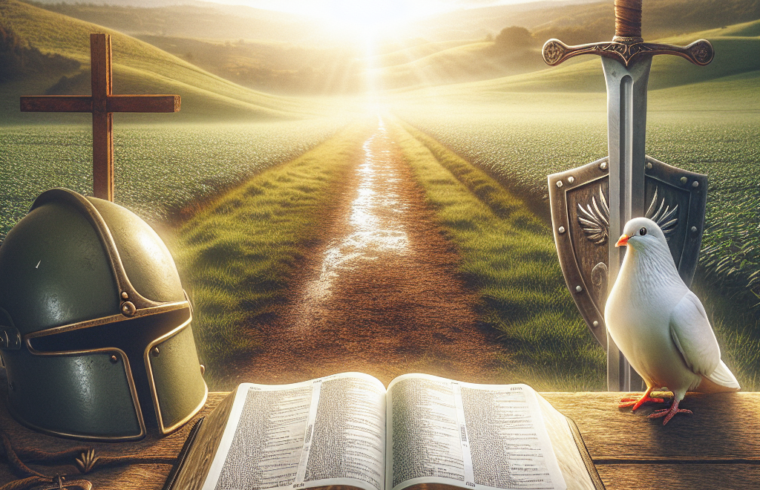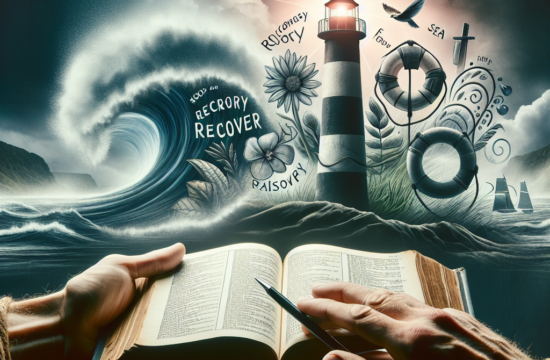==> Thank you for reading this post! Click Here If you are looking for support and Victory over PTSD.
The Power of Faith in Healing
Understanding the Role of Faith
When I first began my journey towards recovery from PTSD, I really didn’t think faith would play a huge role in my healing process. But looking back, I realize how crucial it was. Faith isn’t just about belief; it’s about finding peace in the storm. For many, including myself, tapping into that divine connection during the darkest moments became a source of strength.
I remember attending church services and feeling a sense of belonging and understanding from the community. The sermons often touched on themes of hope and resilience, serving as a reminder that I was not facing my struggles alone. This communal aspect of faith can really ground you and remind you that God’s love is bigger than any trauma you might be grappling with.
As I navigated my healing journey, I turned to scripture that resonated deeply with my experiences. Verses like Philippians 4:6-7, which talks about not being anxious and finding peace in God, really helped to center my mind and heart. These messages became a lifeline, reinforcing my faith and expanding my understanding of healing.
Support Groups and Community
Finding Your Tribe
One of the most impactful components of my recovery journey was finding a support group. You know, that ‘tribe’ you can share your struggles with openly without fear of judgment? It’s out there, and it can be life-changing. I found a local Christian PTSD support group through my church, and it honestly felt like a safe space where we could all bare our souls.
In these gatherings, members would share their stories, and it was like a weight lifted off everyone’s shoulders. We laughed, we cried, and most importantly, we understood each other in a way that others couldn’t. It’s amazing how much healing can happen simply from sharing experiences. It felt like we were carrying each other’s burdens, in true Christian fashion.
The friendships I built in these groups turned out to be incredibly supportive. Whether it’s grabbing coffee together or praying for one another, having those connections allowed me to see that healing doesn’t have to be a lonely road. There’s something powerful about communal support in the name of faith.
Therapeutic Practices
Integrating Faith with Therapy
Now, when I started seeking professional help, I was hesitant at first. But finding a therapist who understood my Christian beliefs made a world of difference. Integrating therapy with faith helped solidify my healing strategy. My therapist encouraged me to incorporate prayer and biblical principles as part of our sessions, making the therapy feel more personal and relatable.
We often focused on techniques that aligned with scripture, such as mindfulness and gratitude. Practicing gratitude was particularly illuminating for me. Each day, I would write down a couple of things I was grateful for, and suddenly, the shadows began to lift. There’s a real transformative power in being intentional about gratitude, and having a spiritual framework to support that made it so much richer.
Working through cognitive behavioral strategies reinforced what I was learning in church too. There was a lot of overlap between the therapeutic exercises and the teachings I was receiving from my pastor. Understanding how thoughts and feelings work in tandem opened my eyes to how faith can play a role in reshaping my mindset.
Prayer and Meditation
Creating Space for Stillness
One of the greatest gifts I’ve discovered in my recovery is the power of prayer and meditation. In our fast-paced world, finding stillness can be a challenge, but carving out a few moments for quiet reflection has brought incredible peace to my life. Prayer became my anchor – a dialogue between me and God where I could voice my pain and anxieties.
Get Support and Help with Recovery! Visit us for more Information and Support
There were times when I’d sit in silence, just being present with my thoughts and feelings, inviting God’s peace to wash over me. I found that meditating on Bible verses helped me feel grounded. Proverbs 3:5-6 became a mantra for trusting in God’s plan, even when I couldn’t see the way ahead.
It’s fascinating how just a few minutes of calm can change your perspective on a rough day. I often emerged from my meditation sessions feeling lighter, more optimistic, and more connected to my faith. It wasn’t always perfect, but each practice brought me or, at the very least, brought me a step closer to finding my peace.
Continued Learning and Growth
Embracing Lifelong Healing
Recovery isn’t a straight line, and I have learned that it requires ongoing effort and dedication. I remember feeling overwhelmed by the idea that I had to ‘fix’ everything. But as I began to embrace the notion of lifelong learning, I started to appreciate the small steps I was taking. Each book I read, each sermon I listened to, brought new insights that contributed to my healing journey.
Online resources, podcasts, and workshops became some of my go-to tools for ongoing education. I soaked in new ideas on how to integrate faith and mental well-being. One resource that really resonated with me was a podcast hosted by a therapist who also operated from a faith-based perspective. Hearing others share their experiences helped me realize that it was okay to keep seeking knowledge and reassurance.
The process of recovery extends beyond our initial pain. It’s about growing in understanding, embracing new truths, and sometimes even helping others along the way. As I learned to share my story and my struggles, I found strength in knowing that together, we pave the path for healing, guided by our faith.
FAQs
1. How can faith help in recovering from PTSD?
Faith can offer a sense of hope, community, and strength. Engaging with scripture, prayer, and the support of a church community provides a different perspective that emphasizes healing and resilience, making it a powerful ally in recovery.
2. What types of support groups exist for those with PTSD?
There are a variety of support groups, including those specifically for Christians dealing with PTSD. Many are faith-based and focus on sharing experiences, providing emotional support, and fostering a sense of belonging among members who understand your struggles.
3. How can I integrate therapy with my faith?
Finding a therapist who shares or respects your Christian values can help. Discuss incorporating faith into your sessions through prayer, scriptural teachings, and therapeutic techniques that align with your beliefs to create a holistic approach to healing.
4. What role do prayer and meditation play in healing?
Prayer and meditation serve as calming practices that create space for reflection, grounding, and connecting with God. These practices help manage anxiety and stress, fostering peace during challenging times, and reinforcing your faith.
5. Is recovery from PTSD a lifelong journey?
Absolutely. Recovery is often not linear and requires ongoing work and commitment. Embracing continuous learning, seeking new resources, and remaining open to growth are key elements in navigating the healing journey throughout life.













